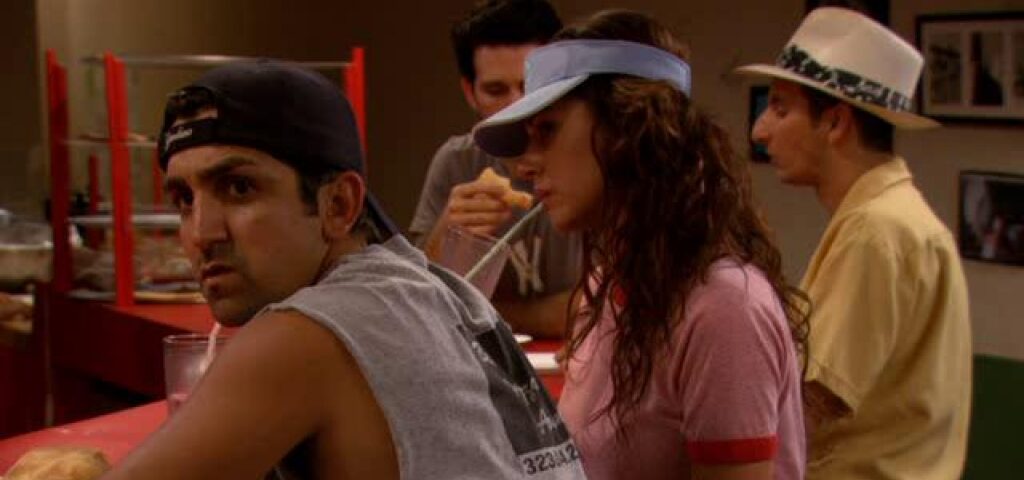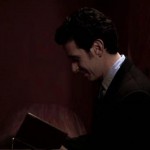There are many ways to learn the art of constructing a compelling narrative: One can read classic novels and plays; one can watch great films and television shows; one can read ancient Greek dramas or watch professional wrestling; and one can even watch serial fiction: From old time movie serials to modern soap operas. I have done all of these things, and the last thing on this list is how I found out about the 97 minute long film, West of Brooklyn, written, produced, and starring Ronnie Marmo.
Marmo is not a big name celebrity actor. He’s a working man’s actor, having founded a Los Angeles theater troupe and production company (68¢ Features), written and produced a number of plays, starred in a few television shows and films, and also had a recurring role, over the last few years, on the longtime American soap opera “General Hospital,” as New York and Port Charles police detective Ronnie DiMestico. After some years as a good guy, as soaps are wont to do, they decided to write off Marmo’s character by making him a dirty cop, with a perverse streak, after years of trying to nail the show’s number one bad guy. Personally, this does not matter to me, but since the turn from good cop to sexual sadist and killer was so ridiculous, I was not pleased with the writing, looked up some online info on the actor, and discovered his “other” acting and artistic career, as well as website.
It turned out that Marmo had “do it yourself-ed” his own semi-autobiographical film West of Brooklyn. One of the interesting things which led me to purchase the DVD on Amazon was that the film featured two other General Hospital alumni: Director Danny Cistone, who in 2011 played a nebbishy character named Jules — henchman to the criminal powerbroker known as The Balkan, and Marmo’s leading lady and romantic interest, Natalia Livingston, who played the twins Emily Quartermaine and Rebecca Shaw (yes, shocking that twins abound on soaps!). Given that the independent film had no reviews of it on any of the major aggregator websites led me to believe that some of the comments on movie boards like IMDB and Amazon might be correct — the film might have been a mere vanity project for Marmo and his crew. To my pleasant surprise, it was not. West of Brooklyn is a good, solid, little film, and Marmo, especially, shows potential as both an actor and writer. Is it a great film? Absolutely not. Does it have flaws? Certainly, and I will detail some of them. But, for every flaw it has a plus, and more pluses, overall, than minuses. And it is one of those overlooked works of art that I enjoy discovering and giving whatever little bit more exposure I can give at Cosmoetica.
The film follows the life of an Italian guy from Brooklyn named Sebastiano ‘Sebi’ Pascuzzi (Marmo), after the death of his mother (Liz Torres) and a fire that destroys the pizzeria of a close family friend, Papo (Robert Costanzo), who treats Sebi and his brothers like his own. Papo decides to move out to Los Angeles, after he gets an offer to manage a pizzeria out there. His whole extended family moves with him, and Sebi gets a job as the assistant to an unnamed and unseen television star, which allows him free living, as well as a few well-wrought, believable, humorous scenes with the star’s dogs as he walks (assistants are also dog walkers) and talks (of his love interest) to them. These scenes are some of the best parts of the film, and show a side of life that most Hollywood films do not show, or, if shown, are well overdone from a naturalistic humor to a forced one.
Sebi fancies himself a latter day Beatnik, and tries writing poetry, which he does . . . badly. But, given that it’s Beatnik style bad verse, this actually helps the character development, as it shows the sort of semi-artsy type that still harbors the romantic fantasies that Sebi and the film embrace. Also, as with most artsy sorts, Sebi has a mentor, albeit one he does not know, for he idolizes a fictive remnant from the Beatnik days, one Gaetano D’Amico (Joe Mantegna), a poet as bad as he is. So the bad poetry may be intended as bad poetry. The other major force and inspiration in his existence comes when a beautiful WASP-y rich girl, Madison — aka Maddy (Livingston) — from Beverly Hills stops in at Papo’s new digs, a joint called Albano’s. A fight nearly ensues between a snotty ex-New Yorker, who arrives with a dumb blond girlfriend, and Sebi’s younger hotheaded brother, Jimmy Boy (James Madio, doing a not so good Joe Pesci impression), a stunad little ginzo, whose Napoleon complex will prove his undoing. Others in Sebi’s “crew” are Jimmy Boy’s girlfriend, Donna Fanucci (Joleigh Fioravanti), a loudmouth, Sal (Mel Rodriguez), a tubby loser and son of Papo, and Franky (Louis Vanaria), a third rate would be crooner, in the Tony Bennett mold.
Maddy and Sebi fall rather quickly in love, and one of the screenplay’s flaws is that we see no real connection between them, as their relationship is of a generic variety, and never developed with specifics, although one excellent scene, riffing on Cyrano de Bergerac, stands out. Sebi gets Franky to sing “Fly Me to the Moon” to Maddy, and then gives her a pear, which is symbolic, to Sebi, of Maddy’s bare back — an odd nut believable fetish. When Maddy asks Franky what the pear is for, he mistakenly believes she does not know what a pear is, and tells Sebi she’s beautiful but not too smart — also a nice, believable scene and comment that says much of all three characters, and very economically and naturally. On the downside, the love scene, between Maddy and Sebi, is far too soap operatic, and dissonant with the best elements of this film, until it is crosscut with the scenes that lead up to Jimmy Boy’s murder. Matty is not a lover of poetry (good nor bad), nor artistic — she’s just beautiful and smiles far too long, in scene after scene. She tends to mouth banalities and, aside from her obvious good looks, West of Brooklyn gives no depth to her character. She seems malleable to Sebi, but we never get the attraction, and their conversations are banality laden, not chock with gravitas nor even connective bullshit.
We get two major scenes of her in her environs, both times with her classist father (John M. Jackson), but the scenes and characters are utterly trite. We know exactly what will be said and what will happen, and the second scene, after Sebi goes back to New York, after Maddy gets pregnant by him (although we don’t know it at the time), after Jimmy Boy is shot dead senselessly, is a totally superfluous because it adds nothing to the development of the father-daughter relationship, nor to the characters themselves. In editing or the screenwriting process, this should have been cut. At the same time, Sebi, after his brother’s funeral, ducks out on his crew, and stays with his older brother Joey (Michael Cavalieri). The few scenes between the two brothers are some of the best in the film, and so is a montage of prior scenes from the film, and images of Sebi reflecting. Another good scene — predictable, but in a realistic way — is the attempted seduction and rebuffing of a former faithless girlfriend’s of Sebi’s, Grace (Angela Pupello).
The film ends with Sebi returning to LA, and finding out that Papo has left Albano’s and opened his own Italian restaurant. The good thing about this denouement is how the film, and final tracking shot, reveal certain plot points, such as Papo’s getting the restaurant due to a financial investment from Maddy, the fact that Maddy has been pregnant, and that Sebi marries her and has been narrating the film, the whole time, to his yet born daughter. The film, made in 2008, and released in 2009, is set in 2005, by film’s end. The last uncut scene is well delivered and shot, and reminded me, in feel, of the end of the 2000 film “Return to Me,” with David Duchovny and Minnie Driver, save that this was a better film, despite the limits of its budget.
As for the two disk DVD from Osiris Entertainment? Disk One contains the film, commentary, and trailer. The commentary, by Marmo and director Cistone, is nothing much. Yes, you get some background on the film’s production, and how it was made, as well as the usual critical fellatio of each other, with a few added comments from Mantegna, but nothing of any depth on the film as art, nor on the aesthetic or technical side. That stated, Marmo, more so than Cistone, gives the listener enough genial and specific anecdotes and charm to make the experience not unpleasant. Disk Two has a 30 minute Behind the Scenes featurette which is about on par with the commentary, in terms of information on the film. There are also a number of deleted scenes — some of which are longer versions of scenes in the film, two more trailers, a photo gallery, and three bad poems from the film, read by Marmo (the first two) and Mantegna, and written by Marmo and Frank T. Rios — a poet well known for being a 5th rate Beatnik, hence neatly answering my earlier query on the whether or not the film’s poetry intendeds to be bad — uh, no!
The acting in the film is wildly variable. Marmo and old warhorses like Torres and Costanzo do quite well in their parts. The scenes of Sebi handling his mother’s death, and holding her, then nothing, in that bed, from an overhead shot, is quite emotionally revealing, and shows Marmo and Cistone at their best — one just wishes that all of the emotions and direction of the film had been as stellar. There are some good supporting performances, starting with the few brief scenes of Cavalieri’s Joey, whose warmth, charisma, and good looks make him a presence onscreen. How this actor has not made it in a bigger way is beyond me. The same could be said for Fioravanti’s Donna, who goes from a smartass bitch to a grieving friend and woman of some insight. And it’s not because the role is written that way, but the looks and glances that Fioravanti imbues her character with. The third unexpectedly good performance comes from Pupello’s emotionally desperate Grace, who appears in only two brief scenes, but nails an archetype while also putting real pity into her character. The rest of the cast is quite mediocre, to be generous — with the worst offenders being Madio’s stale Jimmy Boy, and Jackson as Maddy’s father, giving absolutely no life to his curmudgeon. The film score, by Michael Sherwood and Carl Saunders, is top notch, and not too schmaltzy nor too obvious in giving away emotional cues, and well scored by Marmo’s wife, Wendy. The cinematography, by Florian Stadler and Daniel Stilling is good throughout, with a few moments of high quality, starting right from the fire at Papo’s, which plays under the credits, and economically propels the characters’ diaspora westward. The film also suffers from, especially in its first half, too much narration. Sebi is not Woody Allenesque in his powers of observation, and more annoying than Daniel Stern from “The Wonder Years;” cutting this by 30-40% would have helped, but the overall screenplay, by Marmo, ranges from solid to good.
West of Brooklyn is not a film that will change one’s life. It lacks the artistry to be great, and too much of it follows the banal paths of yore. But, at its best, the film subverts many expectations, and showcases Marmo as a genuinely multitalented artist: Actor, producer, screenwriter . . . but NOT poet! It is the sort of work that I, on a personal level, like stumbling upon, as I have with a number of self-published books I’ve reviewed. It is also a film that aptly shows the seeds for later potential, and on that basis (as well the others mentioned), it’s worth viewing.






'Movie Review: West of Brooklyn (2008)' has no comments